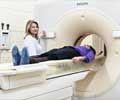It is a common belief that all radiological examinations are essentially harmless, however this isn’t true for Computed Tomography (CT) scans as researchers have found that high doses of radiation from the test may increase the risk of developing cancer.
David J. Brenner, Ph.D., and Eric J. Hall, Ph.D., from the Center for Radiological Research at Columbia University Medical Center, have argued that the potential carcinogenic effects from using CT scans, the diagnostic tool for providing a three-dimensional view of a particular organ or tissue, might be ignored. However, they said that this is of particular concern, because one-third of all CT scans performed in the U.S. may not be medically necessary.They found that the number of CT scans have dramatically increased for everyone over the past 27 years. In 1980, there were only 3 million scans ordered annually in the United States. Now, an estimated 62 million CT scans are performed. The result, researchers said, is a marked increase in the average personal radiation exposure, which has doubled since 1980.
Heavy exposure to CT scan radiations could put people at a higher risk of cancer. Although the individual risk is small, the large number of CT scans presently being given may result in a future public health problem.
Researchers particularly suggested that, in a few decades, about 1½ to 2 percent of all cancers in the U.S. might be due to the radiation from CT scans being done now.
Drs. Brenner and Hall have suggested that the rapid increase in CT usage represents a potential public health problem in the U.S. that should be proactively addressed. This is particularly important for kids, who are more sensitive than adults to radiation exposure.
The issue arises, for example, when CT scans are requested in the context of so-called “defensive” medicine, or when scans are repeated as a patient passes through different parts of the medical system. Compounding the issue, surveys suggest that the majority of radiologists and emergency-room physicians may not appreciate that CT scans are likely to increase the lifetime risk of cancer.
Advertisement
The researchers have suggested three strategies for proactively addressing the potential increased radiation risks associated with CT scans: Firstly, Reduce the CT-related radiation dose in individual patients, Secondly, replace CT use, when appropriate, with other options that have no radiation risk, such as ultrasound or magnetic resonance imaging (MRI) and thirdly decrease the total number of CT scans prescribed.
Advertisement
The findings are published in a Nov. 29, 2007 article in The New England Journal of Medicine.
Source-ANI
SRM/P












